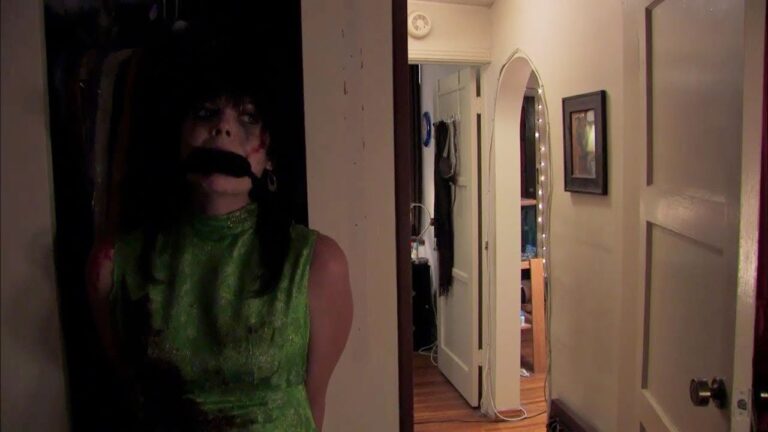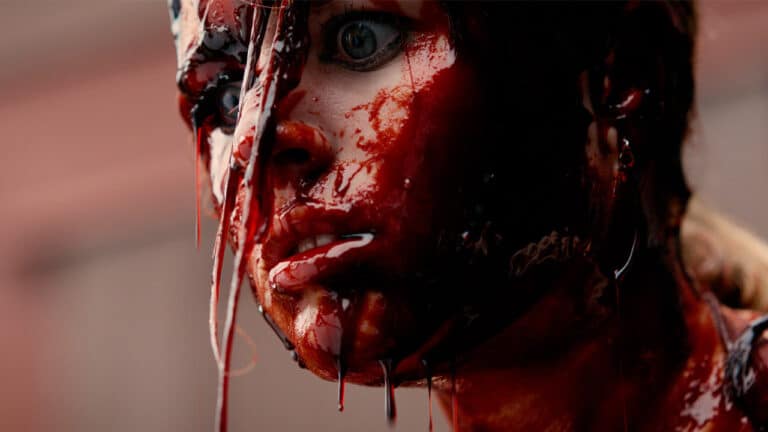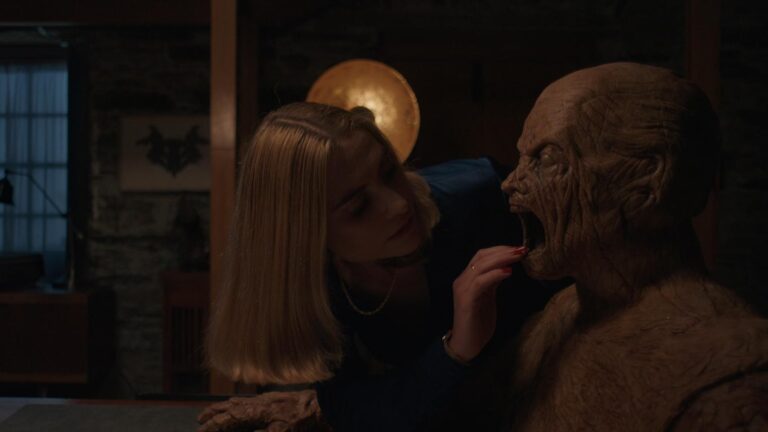
Last Updated on June 17, 2024 by Angel Melanson
Paul Tremblay writes what critics like to call “unfilmable” books. His fiction employs all manner of experimentation and postmodern trickery, often to undermine any secure sense of reality, and to expose the apparatus of storytelling itself. Even M. Night Shyamalan — no stranger to the outer limits of story logic — had to tame the ending of Tremblay’s The Cabin at the End of the World, when adapting it as 2022’s Knock at the Cabin (and much to the detriment of the story’s disturbing, ambiguous impact.)
His single churn through the Hollywood machine took its toll on Tremblay. It also informed his latest novel. Horror Movie is the story of a group of young filmmakers in 1993 and the movie that haunts their lives ever after. It’s told by The Thin Kid, the only surviving member of the cursed shoot. That’s the back cover copy, anyway. Scratch just a little deeper and Horror Movie is an oh-so-Tremblay-ian exploration of how creativity functions, how films are made, and how fear overwhelms. It’s a withering satire of executives who don’t understand the wonder they are selling, and a time capsule of a moment in horror cinema when anything felt possible, and potentially dangerous.
I spoke with Paul a few days before the book’s release to discuss the book, the film within it, and how both continue to illustrate his singular horror perspective.
It’s no secret that you found the adaptation of Cabin a challenging experience. Is this book a direct response to that?
Well it wasn’t as if I thought, “Oh, I’m going to write about my Hollywood experience.” I just happened to have this idea based on how dangerous The Texas Chain Saw Massacre set was, and wondered what if something really horrible had happened that stopped that movie being made. But it just so happened that I was going through the adaptation experience. There were positives. I got to go to set for two days, which saved me a lot of research.
It’s all about fear, but it’s also your funniest book, in my opinion.
I’m glad. I did hope parts of it would be funny. Certainly, there’s a satirizing of Hollywood. The Thin Kid has some snarky conversations with some producers who don’t seem to be very good at their job. There are a lot of anecdotal experiences of mine, but I also took from a lot of writers that you and I both know. Some really big names, and it’s surprising, but also not surprising, how often studios really try to take advantage of writers.
When I signed with my most recent film agent, he told me, “I’m going to pitch you as a creator not a writer, ’cause no one out here respects writers.” And I laughed because I thought he was joking, but, uh, no, he wasn’t. We novelists and short story writers don’t have a union to protect us. So, you know, we talk … and sometimes we write [laughs].
So much of your fiction is a comment on storytelling and writing itself. Does Horror Movie have anything different to say about the nature of cinema specifically?
Horror fiction requires the reader to be active. But with movies, you’re typically way more passive. This book was a way for me to sort of … not juxtapose the two, but to think about them and break down their parts. Many of my favorite stories, I can’t really describe the emotions they invoke in me. The only way I can get to that feeling is by pointing people to the book or movie itself. That’s sort of what I was going for with Horror Movie. It’s a way to hopefully mimic or recall some of my favorite movies and stories.
In the notes, you say that people often describe you as a cinematic writer. Do you agree?
I’m not sure what that means, to be honest, and that note partly reflects my own anxieties and lack of self-esteem as someone who wasn’t an English major and didn’t train in writing. I was twenty-two when I fell in love with reading, and before that, my knowledge of story was almost solely based on film and television.
The last 30 years have been a crash course in reading. I tend to read between 60 and 80 novels a year, way more books than movies these days. But film is still the start of what I thought of as story. And as a writer of novels, I can still put that to use, but I also worry about that because I want to write a book that’s going to be, y’know, a book. I don’t want to write a treatment. Nothing sounds worse to me than writing something that feels like a screenplay, just without the format of a screenplay.
But Horror Movie does include a screenplay. A long, discursive, descriptive one. How did that come to be?
Part of it was that, functionally, I had to tell the reader about the movie. It would have been really boring to just describe it, so I thought I’d include the full screenplay, written in an almost novelistic way, but not quite. It’s a little bit of novelistic necessity, and Cleo [the fictional screenwriter] says, “Hey, I know I wrote a screenplay that breaks all the rules, but I’m doing it purposely because this is the way it has to be for this movie.” It’s kind of an excuse.
Also, part of it, frankly, was me being a little bit of a contrarian, bristling at the idea that a screenplay must have three acts and determined beats every ten pages or so. That just drives me nuts. We’re not writing haikus; we’re telling stories; there shouldn’t be a marriage to a certain form. I mean, have any of these studio execs watched Asian horror, or horror movies from Europe?
The film is a very weird piece of disturbing arthouse horror. Are you poking fun at a certain kind of horror movie?
I dunno. I’m glad that you read it that way. That’s cool! I think I was just too close to Cleo and thinking I would be really into this if I were 23. I did want the movie to be disturbing and hopefully scary by the end. Although for me, that’s always the hardest part. I have no idea what’s scary. I just know what makes me feel weird. And I just go with it.
There’s a scene late in the screenplay and book, in which you make the reader wait interminably for a jump scare that, as horror fans, we must know is coming. It becomes a whole meta-discussion about the machinery of fearful cinema. Talk me through that scene.
Well, thank you very much. I’m honored that it worked. For most of my books, I always have one or two scenes that I treat like the carrot at the end of the stick. I’ll never skip ahead, because if I did, I would never write the other stuff. I make it so I need to write all the stuff that’s hard, to get to the thing I’m really excited about writing. That scene was my carrot, but I really had no idea what I was going to do once I got there, other than just work the general parameters of the tension of waiting for a character to appear from a darkened area.
Oh man, so many of my books have a scene where someone’s alone in a dark room. Why the hell is that? I guess it’s such a simple setup, a simple scare. We’re all afraid of being in a dark room, but that’s the question of horror: why do we keep going back into that room? That scene let me really dig into it, which is fun.
If Horror Movie were to be adapted, do you think a filmmaker could get away with including that long, long wait?
God, I hope they would do it. Just so I could watch people’s reactions to it.
Did you have specific inspirations in mind when creating the movie?
The book started with me going down a Texas Chain Saw rabbit hole, although I certainly wouldn’t describe my screenplay as very Texas Chain Saw. We were talking about the activeness of reading and the passivity of movie viewing. I think the original Texas Chain Saw Massacre is one of the few movies that pulls the trick of making the viewer an active participant.
That movie famously has so many people with false memories. Memories of seeing Leatherface disembowel the kid in the wheelchair or something like that, which never happens on screen. That’s the power of that movie –– and why I think all of its sequels fail by comparison –– because it’s just this magic, weird, dangerous thing that burrows inside your head. So, even though my movie is probably not very Texas Chain Saw-y, how that movie makes me feel was a big part of it.
I briefly thought of trying to do something like the movie Borgman, for the end of the screenplay. That’s a very weird, very disturbing movie, but in the end I went in a much different direction. Otherwise, it’s just a lifetime of watching movies.
Where do you stand on the phenomenon of “cursed” movies?
I was interested in it like any horror fan, but I don’t think there’s any such thing as a cursed movie. There’s a really good show on Shudder (Cursed Films) and they present the idea pruriently at first, but by the end, no, it’s just that horrible things happen to people on set because life happens. When you have that many people on set for six months, it’s almost a statistical probability that something’s gonna happen to someone along the line, not necessarily on set, but in their later lives maybe. But there’s this weird want for our art and our real lives to intertwine. Sometimes it’s in healthy ways, and sometimes it’s not so healthy.
Horror Movie is now available at your favorite bookstores. This interview has been edited for length and clarity.









